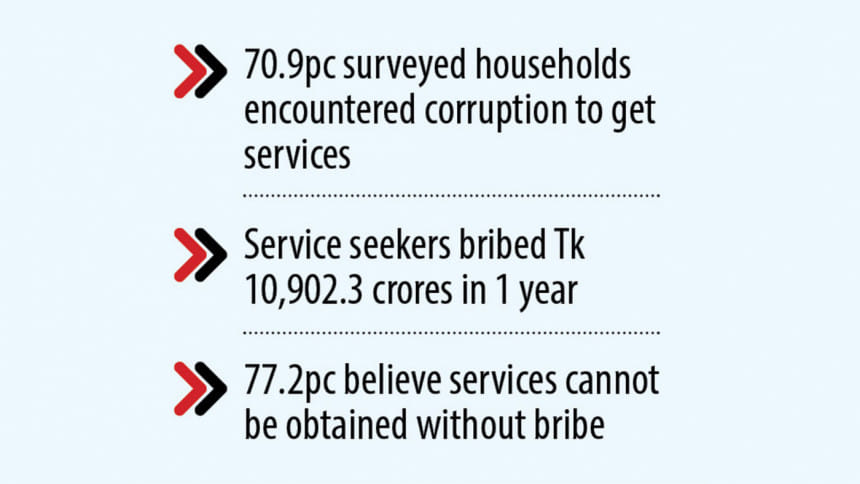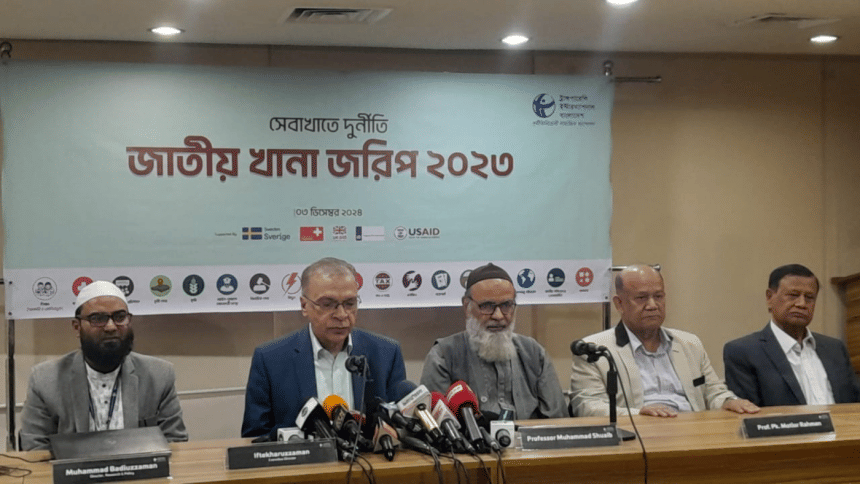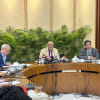Service seekers paid Tk 1.46 lakh crore in bribes during AL rule

People paid an estimated Tk 1.46 lakh crore in bribes to get services during the 15 years of Awami League rule, according to findings of Transparency International Bangladesh.
The anti-corruption watchdog derived the estimate from an analysis of six similar household surveys conducted between 2010 and 2023. All surveys consistently highlighted the entrenched corruption during Hasina's regime.

The latest study, which surveyed 15,515 households, revealed that 70.9 percent of respondents encountered corruption while seeking services between May 2023 and April 2024. They paid Tk 10,902.3 crore during this time, according to TIB's "Corruption in Service Sectors: National Household Survey 2023".
The TIB disclosed the findings at a press conference at its Dhanmondi office yesterday.
It found that the Department of Immigration and Passports, Bangladesh Road Transport Authority (BRTA), and law enforcement agencies were the most corruption-prone sectors respectively.
However, service seekers paid the highest amount in bribes to avail judicial services, land- related services, and banking services, it said.

The organisation made nine specific recommendations, including bringing corrupt people to book, digitalisation of all services, updated code of conduct for each service providing agency.
TIB Executive Director Iftekharuzzaman said the tools available to combat corruption are not being utilised.
"The commitment, promises about zero tolerance against corruption remain only on paper …," he said, adding that it seems corruption is getting some sort of acceptance among the people.
Iftekharuzzaman stressed the need for holding the corrupt accountable to effectively curb corruption and hoped that the interim government would set up an example paving the way for better practices in future.
The TIB has been publishing this report since 1997. Yesterday, it published the 10th one.
The report covered 17 service sectors, mostly government services, "riddled with petty corruption". It excluded areas known for large-scale corruption, like procurement, supply chain, and mega projects.
FINDINGS
The survey revealed that 70.9 percent of surveyed households has experienced corruption in some form while availing services. The figure is the same as the survey of 2021.
The passport service (86 percent respondents) was identified as the most corrupt sector, followed by BRTA (85.2 percent), law enforcement agencies (74.5 percent), judicial services (62.3 percent), and land services (51 percent).
Overall, 50.8 percent surveyed households reported paying bribes or being forced to pay extra for services.
Between May 2023 and April 2024, service seekers paid around Tk 10,902 crore, which is 1.4 percent of the revised national budget for the 2023-24 fiscal year and 0.2 percent of GDP, it says.
Each household paid Tk 5,680 in bribe on an average, it said.
For judicial services, households on average paid Tk 30,972 in bribes or in unauthorised payments, the highest in any sector. Second highest was land services with an average payment of Tk 11,776 per household; followed by banking services with an average of Tk 6,681 per household; and BRTA services with an average of Tk 6,654 per household.
People faced other forms of difficulties too, including delays (46.5 percent respondents), having to go through brokers (39.4 percent), harassment (18.1 percent), and negligence of duties (9.8 percent).
According to the 2021 survey, the most corrupt-ridden service provider was law enforcement agencies followed by Department of Immigration and Passports, and the BRTA. The previous survey said 40.1 percent of surveyed households had to pay bribe and the total amount of bribe money was Tk 10,830 crore.
The latest survey said 77.2 percent respondents provided bribe because "services cannot be obtained without paying a bribe," highlighting a concerning institutionalisation of bribery.
Around 60 percent respondents said they do not know how to lodge complaints about corruption. Only 0.6 percent victims filed complaints with the Anti-Corruption Commission.
When asked why they did not file complaints, 45 percent respondents said they did not feel it was necessary since the system was corrupt while 29.7 said they did not know how to lodge complaints.
At least 47.7 percent respondents cited impunity is the reason behind the rampant corruption while 33.8 blamed lack of social awareness.
About 54.5 percent respondents recommended punishing the culprits for curbing corruption while 22.1 percent and 21 percent spoke for intensifying monitoring and launching a social movement.
"The survey findings indicate that corruption has been a common phenomenon particularly in receiving services from judiciary and the law enforcement agencies, which impedes the poor people to access justice," read the executive summary of the report.
The report said impact of bribes and unauthorised payments is comparatively higher on low-income households.
"Households with a monthly income below Tk 24,000 spend 0.93 percent of their annual income on bribes, whereas for households with a monthly income exceeding Tk 85,000, this rate drops to 0.21 percent," it reads.
The survey also found that corruption and bribery experienced by women, religious minorities, indigenous people, and individuals with disabilities create an additional burden on their limited socioeconomic capabilities, exacerbating their marginalisation.
Asked why law enforcement went down notches in the survey, Iftekharuzzaman said police are now increasing getting involved in high-level corruption, and that they are not confined to the bribery.
Responding to another query, he said the amount of bribe paid to avail judicial services was the highest because people need to seek services several times.
Iftekharuzzaman, TIB research fellow Mohammad Nure Alam, and research associate Abdul Hannan Sakidar presented the outcome of the survey.

 For all latest news, follow The Daily Star's Google News channel.
For all latest news, follow The Daily Star's Google News channel. 









Comments